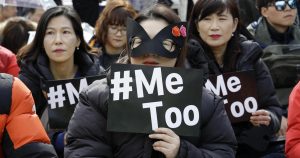By Tiger Hobday
The sun scorches on a hot Saturday in downtown Seoul, South Korea. The streets of the Western town located in the city are filled with the hustle-and-bustle of Korean citizens, international tourists, expats and the usual young American soldiers. On the second floor of one of the buildings on the main street is a red-painted restaurant. Inside that restaurant, I am scrambling to take demanding orders from starving customers when a life-changing episode completely alters my perceptions of the world of work and the dynamics inside the restaurant. I was close to my manager at the time, whose smile would later turn into a menacing grin. When I first started the job, he was someone that I could approach. He would praise me for my hard work and would sneak me the best food from the kitchen during lunch breaks. He even once bought me a candle that read, “Marina, the Best Worker in the World.” Little did I know at age of 18 that this man, someone who I trusted in a higher position, would end up sexually harassing me.
A group of American soldiers had entered the restaurant, boisterous and hungry. American soldiers were usually my favorite customers because they tip generously unlike Koreans who do not. Firstly, Koreans do not tip. However, Americans generously tip, especially towards me as I was fluent in English or perhaps because I was a young girl. I was also accustomed to male customers making flirtatious comments, but they never commented on my sexuality or my body. As a result, I never felt unsafe and did not take the comments too seriously. On that day, I took the order from these young men and entered the kitchen. As I was heading back out, my manager took me aside and asked me “Why did you spend so much time talking to those customers? It is not your job to flirt.” The comment took me by surprise, and I was at a loss for words. What was he accusing me of? However, the restaurant was too busy to start an argument with him. I quickly apologized and got back to work.
Throughout the day I started to receive harassing texts from him. “Why do you only go to male customers? Do not act cheap. Go put on more clothes. This is why I don’t like to hire women. I was mesmerized by your pretty face; sad you do not have a pretty personality. Those tips are only earned by your slutty behavior. I am sure that you must be sleeping with these customers on a regular basis, no wonder they keep coming back.” At my shift’s end, I burst into tears in the changing room. I decided I had enough. I walked into the office and confronted my boss about the texts. He looked at me with a cold face and said, “Why are you showing me this?”. I told him it was because it was sexual harassment, and he replied that if it did not affect my work performance it was not a matter of importance.
This event happened in 2015. Only in 2018 did South Korea follow the US in the #MeTooMovement with the primary motive of encouraging victims of sexual harassment to come forward and share their stories. The South Korean Labor and Gender Equality Ministries launched a public campaign program to raise awareness regarding sexual harassment. But would this effort be enough to change things? And why did it take so long to happen?
Equality Ministries launched a public campaign program to raise awareness regarding sexual harassment. But would this effort be enough to change things? And why did it take so long to happen?
Experts suggest that public awareness regarding sexual harassment in Asian countries is considerably lower than in Western nations. Patriarchy remains deeply entrenched in the roots of most South Korean communities: it is a society where men hold most of the power and women are mostly excluded from it. This is a traditional family system still practiced through patrilineal lineage where the wife’s role is to hold down the household, subordinate to the father’s position as head of the family. Starting in the late 19th century, women began to become educated in greater numbers due to the introduction of an education system introduced by Western Christian ministries. There were schools that had a specific goal of educating women, the most notorious being Ehwa University which was founded in 1886. By 2000, women in higher education were one third of the student population but in 2016 that rose to 42%. As a result, they are entering the workforce in greater numbers in Korea. However, research reveals that approximately 78% of the sexual harassment victims seldom report their incidents since they lack trust in the system.
The nation’s male-dominated culture places women at an increased risk of becoming potential victims. Women are perceived as inferior regardless of their education and careers; this reflected the experience I had with approaching my boss’ attitude towards the situation. He still did not see my complaint on sexual harassment as one that should be equally addressed in comparison to complaints my coworkers had presented. Such incidents of prejudice and discrimination have discouraged female victims from speaking out about their encounters.
Korea women in professional jobs experience similar issues in the workplace. Unfortunately, South Korean patriarchal culture and traditions help propagate sexual harassment in the workplace. Research shows that men occupying superior office positions promote demeaning and sexually harassing behavior towards women in the lower ranks, reflecting the experience of my male manager and me. Statistical evidence reveals that approximately eight out of ten working women in South Korea are victims of sexual harassment One example is of office parties, where entertainment provided involve escorts or prostitutes and is focused on entertaining male employees or clients. This is seen in big companies that do business with other companies, such as in the entertainment industry, where the aim is to please their clients in order to solidify a business deal that benefits the company financially. They use the sexuality of women through providing female entertainment to show “hospitality” to their clients. This creates a hostile environment for professional women who mostly chose not to participate and are then excluded by their coworkers. The hardships that professional women face seem to be never ending. Don’t you think it is time for it to stop?
On the other hand, when I arrived in the US, I had a completely different work experience. As part of my orientation, I had to complete a workshop on Title IX: a title based on the laws protecting workers against sexual discrimination in the workplace. I was shocked that my job emphasized this training and the protection of women as I never had such an opportunity or education in Korea. Furthermore, by living in the US I have seen the success of how the system apprehends sexual harassers and encourages people to report such incidents. I witnessed how strong the #MeTooMovement was in America, the solidarity between women on social media, the Women’s March in DC and even the Women and Gender Office at my university. These movements and safe places create environment for women to speak about the injustices that they face.
The progress made in the US on providing women legal protections for sexual harassment and the social support for those who speak out gives me hope similar changes can happen world-wide. By all genders uniting on the importance of creating equality through feminism, the unified effort has the potential to create this change. There must be an effort to not just create a culture that frees women and men from patriarchal constraints but also one that detaches men from the assumptions of a patriarchal educational system that encourages them to think less of their female peers. If we accomplish these aims, then the struggles of a Ko-reer woman will have been worth it.
Tiger Hobday is an international at East Carolina University and goes by the pronouns She/Hers/Her. She is originally from London, UK and Seoul, South Korea. She studies sociology with her main focus on feminism and international human rights. In her spare time, she enjoys producing music.



 Equality Ministries launched a public campaign program to raise awareness regarding sexual harassment. But would this effort be enough to change things? And why did it take so long to happen?
Equality Ministries launched a public campaign program to raise awareness regarding sexual harassment. But would this effort be enough to change things? And why did it take so long to happen?